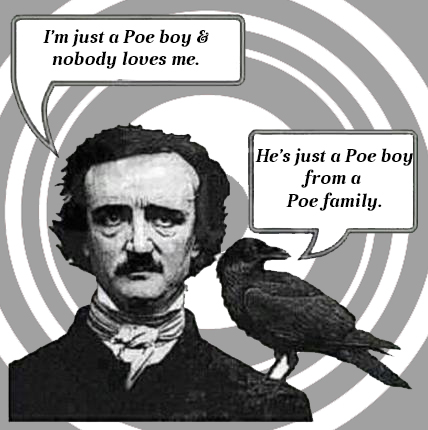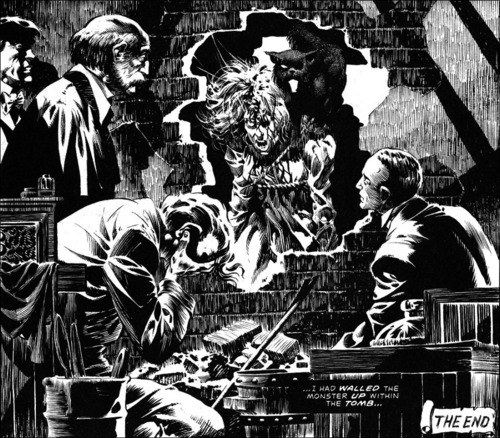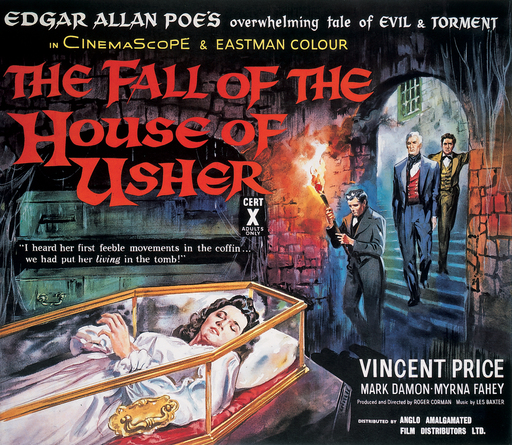And here we are for the third installment of Tackling Poe: The Complete Works. I’ve been having a lot of fun doing this, as I’m finding out so much about this author I greatly admire. Something I haven’t been adding to my reviews are all the fun words that Poe uses in his works. There are a whole bunch that I think add so much color to the story that I’ve started my own Dictionary of Purple Prose. It’s a stand-alone page, so feel free to bookmark it, suggest words, and use them in your stories to your heart’s content!
This time, we’ll be taking a larger bite out of the anthology by looking at nine stories:
- The Purloined Letter
- The Thousand-and-Second Tale of Scheherazade
- A Descent into the Maelström
- Von Kempelen and His Discovery
- Mesmeric Revelation
- The Facts of the Case of M. Valdemar
- The Black Cat
- The Fall of the House of Usher
- Silence – A Fable
Because it was so fun, though, I’m going to throw out another little gem of Poe humor before we get started:
The Purloined Letter
Audio Version: Librivox (Track 4)
Text Version: Virginia University
Word Count: 6,916 words
Summary: Another mystery featuring Dupin and his friend, The Purloined Letter is a crime regarding a woman of high standing, and a minister who steals a letter containing sensitive information. The Parisian police force can not seem to find the letter despite scrupulous searches, and so seeks the aid of Dupin.
Review: This story didn’t really make sense to me. Dupin’s resolution of the crime is, at best, convenient, and only served to provide proof of his own analogy of reason and logic when concerned with left or right-brained people. While in The Mystery of Marie Roget I only mildly disliked Dupin, in this story, I find I just don’t care for him. There’s something very off-putting about his dialog, which is also insipid in the narration, which (in turn) took me completely out of the story. The writing is still good, but it’s not Poe’s best, especially in terms of detective fiction, and the bar he set with The Murders in the Rue Morgue.
Some of the lines I liked:
For one hour at least maintained a profound silence; while each, to any casual observer, might have seemed intently and exclusively occupied with the curling eddies of smoke that oppressed the atmosphere of the chamber.
And, when describing the Minister:
His lynx eye…
And, when G– gets the letter, at last:
This functionary grasped it in a perfect agony of joy…
The Thousand-and-Second Tale of Scheherazade
Audio Version: Librivox (Track 13)
Text Version: Edgar Allan Poe Society of Baltimore
Word Count: 5,618 words
Summary: In this “Tellmenow Isitsoornot” tale, the final voyage of Sinbad, the young wife who has staved off execution for one-thousand-and-one-days errs, and tells one more tale after her pardon, no more absurd than the others, which leads to her hanging.
Review: This was another story where Poe was trying to be clever. The story reads just as any of the other tales from The Arabian Nights, but all of the fantastical elements are true things that came to pass in the world since that book’s publication. The king, in the story, is quick to call absurdity when he hears the earth is round, or that plants can grow out of rocks (algae). Overall, a clever and funny idea, but the text itself was for the most part boring, as I’m finding with most of the stories where Poe’s intent is to be ironic, or witty.
Some of the lines that stood out:
The narrator, disappointed that the sultan did not keep his vow to kill his final wife:
The king’s curiosity, however, prevailing, I’m sorry to say, even over his sound religious principles, induced him for this once to postpone fulfillment of his vow until next morning, for the purpose and with the hope of hearing how it fared in the end with the black cat (a black cat I think it was) and the rat.
And, a modern ship (I believe) described as a sea monster:
[He] had once heard of this sea beast; that it was a cruel demon, with bowels of sulfur and blood of fire, created by evil genii as the means for inflicting misery upon mankind.
And the wife, explaining that shape of the world Sinbad visited:
…in that part of the world, by no means flat, [is] round like a pomegranate, so that we went-so to say-either uphill or downhill all the time.
And of a train:
Among the magicians were domesticated several animals of very singular kinds; for example, there was a huge horse whose bones were iron and whose blood was boiling water. In place of corn, he had black stones for his usual food; and yet, in spite of so hard a diet, he was so strong and swift that he would drag a load more weighty than the grandest temple in the city, at a rate surpassing that of the flight of most birds.
“Twattle!” said the king
A Descent into Maelström
Audio Version: Audio Book (paid)
Text Version: Edgar Allan Poe Society of Baltimore
Word Count: 7,103 words
Summary: A guide speaks to the narrator of a terrible storm in the Maelstrom, which resulted in the death of both his younger and older brother.
Review: I really liked this story. The prose was just gorgeous, especially in the beginning, and the story felt complete. I liked the ‘Legend of…’ feel to it, as well. Little bits, like the sailor’s hair turning ghost white after the event, really made it a powerful piece, but it’s hard to go wrong with any story set upon a dark and dreary coast.
Some of the lines I really loved, including the very first line:
We had now reached the summit of the loftiest crag. For some minutes the old man seemed too much exhausted to speak.
And, here, as the narrator notes the guide’s position on the cliff side:
In truth so deeply was I excited by the perilous position of my companion, that I fell at full length upon the ground, clung to the shrubs around me, and dared not even glance upward at the sky–while I struggled in vain to divest myself of the idea that the very foundations of the mountain were in danger from the fury of the winds.
And, the guide, speaking:
“Now raise yourself up a little higher–hold on to the grass if you feel giddy–and look out, beyond the belt of vapor beneath us, into the sea.
And:
…ungovernable fury [of the sea]…
And:
Here the vast bed of waters, seamed and scarred into a thousand conflicting channels, burst suddenly into frenzied convulsion–heaving, boiling, hissing–gyrating in gigantic and innumerable vortices, and all whirling and plunging on to the eastward with a rapidity which water never elsewhere assumes except in precipitous descents.
Von Kempelen and His Discovery
Audio Version: Audio Books for Free
Text Version: Edgar Allan Poe Society of Baltimore
Word Count: 2,873 words
Summary: A newspaper article which claims that a man by the name of Von Kempelen has discovered the alchemical process by which to turn iron into pure gold.
Review: You guessed it! Another hoax, sent to the newspapers and actually printed, though not many people believed this one. There were interesting bits in this one; questions posed about how the abundance of gold would, indeed, suddenly make it worthless, and how countries would actually respond to such an event. It wasn’t as dry as his other articles of this nature, so I actually recommend this one, at least to see how utterly convincing Poe can sound with fake research.
Mesmeric Revelation
Audio Version: Librivox (Track 6)
Text Version: Edgar Allan Poe Society of Baltimore
Word Count: 3,838 words
Summary: A hypnotist, at the request of his patient, has a discussion with the latter about the metaphysical properties of the universe, ‘What is God?’, and other intangible, esoteric topics.
Review: This was a strange story, and rather difficult to get through because of the antiquated language. It was also largely unusual from the works of Poe so far, because it dealt more with the existence of God and the afterlife, when Poe’s stories more often have been dealing with logical fallacy, superstition (which is related to the belief in god, yes, but does not question ‘what’ god might be), and despair. I felt, at times, I was reading in Freud or Jung, instead of a fiction, the language was so different. Overall? I’m on the fence as to whether I like it or not, but it has lingered.
Some samples of the story:
On being a skeptic, and talking about an author:
In his summing up it seemed evident to me that the reasoner had not even succeeded in convincing himself.
The hypnotized, speaking of the nervous system, and of the difference between the human form, and god form:
A luminous body imparts vibration to the luminiferous ether. The vibrations generate smaller ones within the retina; these again communicate similar ones to the optic nerve. The nerve conveys similar ones to the brain; the brain, also, similar ones to the unparticled matter which permeates it. The motion of the latter is thought, of which perception is the first undulation. This is the mode by which the mind of the rudimental life communicates with the external world; and this external world is, to a rudimental life, limited, through the idiosyncrasy of its organs. But the ultimate, unorganized life, the external world reaches the whole body (which is of substance having affinity to brain, as I have said,) with no other intervention than that of the infinitely rarer ether than even the luminiferous; and to this ether–in unison with it–the whole body vibrates, setting in motion the unparticled matter which permeates it. It is to the absence of idiosyncratic organs, therefore, that we must attribute the nearly unlimited perception of the ultimate life.
The Facts in the Case of M. Valdemar
Audio Version: Librivox (Track 5)
Text Version: About.com
Word Count: 3,464 words
Summary: Another story about mesmerizing, this time with the purpose of staving off death in a tuberculosis patient for as long as possible. The hypnotist is able to suspend death for almost seven months, while having fleeting conscious contact with the subject under his influence.
Review: Poe really likes his hoaxes! Yet another, published, and widely distributed all through the U.S. and Europe, with other hypnotists defending the truth of the article. Of course, it wasn’t. This was probably the most interesting of Poe’s hoaxes to read. I really enjoyed it, and the ending was classic. Highly recommend this one!
One line on death:
…his approaching dissolution…
The Black Cat
Audio Version: Librivox (Track 2)
Text Version: Online Literature
Movie Version: (Short Film)
Word Count: 3,964 words
Summary: A man, predisposed with a gentle disposition and love of animals, gradually grows to despise his black cat, Pluto, and after half-blinding the animal, hangs it outside on a tree. Soon after, he grows attached to a new black cat, with a white marking resembling a noose on its neck, and the speed of his descent into madness increases.
Review: A favorite of many readers, The Black Cat is perverse and horrifying tale, chalk full of superstition and curses. Another story that easily, and heartily, recommended.
And, because N J informs me that The Black Cat reminds her of the following:
The Fall of the House of Usher
Audio Version: Archive.org
Text Version: Virginia University
Movie Version: (Trailer, 1960) [Gotta get some Vincent Price!]
Word Count: 7,289 words
Summary: A man, at the request of his long-time friend, goes to the House of Usher to keep his friend company and help improve his mood, even as the master of the house’s sister grows ill and dies.
Review: Oh man, there is a reason this story is classic Poe. Read it! It is amazing…. so many lines, such beautiful text, and just over all creepy. It feels very similar to a lot of his other stories, because I think Poe fell in love with certain themes, but I particularly loved the addition of the house as a character.
Some of my favorite parts, starting with the opening line:
During the whole of a dull, dark, and soundless day in the autumn of the year, when clouds hung oppressively low in the heavens, I had been passing alone, on horseback, through a singularly dreary tract of country; and at length found myself, as the shades of evening drew on, within view of the melancholy House of Usher.
And:
Minute fungi overspread the whole exterior, hanging in fine-tangled web-work from the eaves.
And:
While the objects around me–while the carvings of the ceilings, the sombre tapestries of the walls, the ebon blackness of the floors, and the phantasmagoric armorial trophies which rattled as I strode, were but matters to which, or to such as which, I had been accustomed from my infancy–while I hesitated not to acknowledge how familiar was all this–I still wondered to find how unfamiliar were the fancies which ordinary images were stirring up.
Annnnd:
“In this unnerved–in this pitiable condition–I feel that the period will sooner or later arrive when I must abandon life and reason together, in some struggle with the grim phantasm, fear.”
And, when they bury his sister:
Having deposited our mournful burden upon tressels within this region of horror, we partially turned aside the yet unscrewed lid of the coffin, and looked, upon the face of the tenant.
And:
I endeavored to believe that much, if not all of what I felt, was due to the bewildering influence of the gloomy furniture of the room–of the dark and tattered tapestries, which, tortured into motion by the breath of a rising tempest, swayed fitfully to and fro upon the walls, and rustled uneasily about the decorations of the bed. But my efforts were fruitless. An irrepressible tremor gradually pervaded my frame; and, at length, there sat upon my very heart an incubus of utterly causeless harm.
Silence- A Fable
Audio Version: Lit-2-Go
Text Version: Lit-2-Go
Word Count: 1,323 words
Summary: A devil recounts a tale in the rhythm of a sermon, speaking of a faraway place of no quiet or silence, and of a rock with changing words carved upon its surface, and the Roman who sits upon it.
Review: The writing style of this piece was interesting, and I enjoyed the imagery very much, but there wasn’t much of a story, or a fable, so much as an observation on the carnal fears of man. It’s a short enough read that I recommend it, but it’s not one of my favorites.
A few lines:
“The waters of the river have a saffron and sickly hue; and they flow not onwards to the sea, but palpitate forever and forever beneath the red eye of the sun with a tumultuous and convulsive motion. For many miles on either side of the river’s oozy bed is a pale desert of gigantic water-lilies….”
And:
“And his brow was lofty with thought, and his eye wild with care; and, in the few furrows upon his cheek I read the fables of sorrow, and weariness, and disgust with mankind, and a longing after solitude.”
And so ends Part 3! I’m getting really excited for the next installment! It includes so many of my favorite stories, including “The Masque of the Red Death”, “The Cask of Amontillado”, and my all-time favorite “The Pit and the Pendulum”. This anthology is heating up! (Though I still have to wonder about Poe’s obsessive use of the semicolon… anyone know what the historical rules of its use were?)
If you’d like to read any of the other parts, Feel free to check them out below:




17 responses to “Tackling Poe: The Complete Works, Part 3”
As much as I love Poe, I must admit that I loathed “The Purloined Letter.” I found myself nodding while reading your review of the story. Dupin comes across as arrogant and downright unlikable. I, too, enjoyed “A Descent into Maelstrom.” I never was a big fan of Poe’s hoax letters, and I have to wonder how his wife Virginia, quite ill with tuberculosis at the time, felt about “The Facts in the Case of M. Valdemar.” (I’ve always been fascinated by Virginia, and I recommend the novel “The Raven’s Bride” by Lenore Hart, which features Virginia as the main character.) Like many others, I consider “The Black Cat” and “The Fall of the House of Usher” two of Poe’s best stories. (Though my absolute favorite is still to come!) Another fantastic installment, Tokyo! I’m looking forward to reading more!
LikeLike
Thanks so much for the comment Miranda. You do bring up a good point about his wife. That book sounds really interesting… I’ll have to add it to my wishlist. As I understand it, she was quite sensitive to Poe’s sensibilities, but maybe things were different towards the end. I do want to find out more about her, if the information’s there! (The only thing I can’t do is perceived fiction of real people… I got really turned off of it after a woman published one of my favorite classical author’s diaries as truth, when it fact it was all made up. I found out later from a professor at my school that the author was actually ridiculed in the scholarly field for her lack of knowledge and sensationalizing of a very strong, independent court lady (who could write when no women were supposed to know how, and actually wrote the world’s first ‘novel’ novel!)
LikeLike
You might not care for “The Raven’s Bride,” then, because it’s told from Virginia’s point of view, and while the author does a great job of giving Virginia a voice, and it’s obvious she did her research, there’s unfortunately not a lot of information about Virginia available. I’ve read just about everything I can find on Poe’s life, and I think the novel is a good representation of the relationship between the two of them, but it is fiction. But because Lenore Hart did such meticulous research and the novel reflects that, I’d still recommend it.
LikeLike
A great post, Alex! I enjoyed Poe’s tales of the supernatural always a little more than some of his other works. This series is very interesting and I can’t wait to read more!
LikeLike
Again, skipping the reviews, but I will come back and read them once I get around to doing my Poe thing.
LikeLike
Thank you for posting “Tackling Edgar Allan Poe: The Complete Works, Part 3 – Alex
Hurst”. Imay really wind up being back
for a great deal more browsing and writing comments soon enough.
Many thanks, Carmen
LikeLike
[…] Part 3 […]
LikeLike
[…] Part 3 […]
LikeLike
[…] Part 3 […]
LikeLike
[…] Part 3 […]
LikeLike
[…] story reflects much of a prior short story of Poe’s, A Descent in Maelstrom, in that two men, the narrator (Arthur) and his friend (Augustus) take to sea during a storm and […]
LikeLike
[…] Part 3 (Short Stories) […]
LikeLike
[…] Part 3 (Short Stories) […]
LikeLike
[…] Part 3 (Short Stories) […]
LikeLike
[…] Part 3 (Short Stories) […]
LikeLike
[…] Part 3 (Short Stories) […]
LikeLike
[…] The Fall of the House of Usher […]
LikeLike